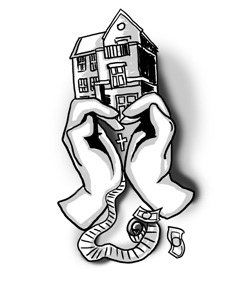METRO SHANGHAI / FENG YU'S COLUMN
Charities can regain trust with transparency

Illustration: Lu Ting/GT
Project Hope, a charity that builds schools in poverty-stricken areas in China, recently received 20 million yuan ($3.23 million) in cash that was left to it in the will of an elderly Shanghainese man. This is the largest gift the charity's Shanghai branch has received since its establishment 20 years ago, according to a report by the Oriental Morning Post.
The donation dates back to 2011 when the man, named Xu Shaocun, decided to donate the villa he inherited from his father to the charity. Xu's father was once a famous figure in the city who managed a landmark hotel and a Western-style restaurant in downtown Shanghai before 1949.
Xu died in 2011 and in his will he entrusted Xu Zuqian, his nephew, to handle the donation. The three-story villa was built in 1936 on Huaihai Road Middle, near Gao'an Road in Xuhui district. The senior Xu spent almost his entire life there. He never married and didn't have any children.
The Chinese media report revealed that the villa is the only property Xu senior owned and that he lived quite a lean life in his last years. He was touched when he learned from a TV program that some child survivors of the Wenchuan earthquake in Sichuan Province no longer had schools to go to. Xu decided to help people in poor situations in remote places.
It took Xu junior time and effort to sell the villa, solve legal issues, pay back outstanding debts and complete the donation. Finally, the 20 million yuan was paid into Project Hope's account.
Project Hope is currently building two primary schools, one in Xinjiang Uyghur Autonomous Region and the other in Hebei Province. An official with the charity told the Oriental Morning Post that a fund named after Xu Shaocun has been established and that details of how the money is used will be released online.
This story serves as a ray of good news for China's charity sector, which has been buffeted by a string of scandals that have severely dented public confidence.
The latest case is the charity named Smile Angel Foundation, being heavily criticized by activist Zhou Xiaoyun, who suspects it of financial malpractice. Smile Angel was founded by pop diva Faye Wong and her ex-husband Li Yapeng. Li now handles the charity's management. Although no final conclusion has been drawn, the case once again cast a shadow on the already-tainted reputation of charities in China.
The Red Cross Society in China came under fire in 2011 when Guo Meimei, a 20-year-old microblogger, claimed to be the general manager of a unit called Red Cross Commerce and posted pictures showcasing her luxurious lifestyle online.
The incident triggered public outrage, as it was assumed she was using Red Cross money to fund her lavish habits. It led to calls for greater transparency from charities when they allocate funds donated to them by the public.
However, restoring public trust is far more difficult than demolishing it.
Project Hope is not scandal-free either. We have seen news reports that overseas donors were disappointed to find that the Hope schools they donated to fail to be completed, without explanation.
It's obvious that the latest donation in Shanghai is a huge positive for the charity field in China. The case shows that people are still willing to help others. Society does need professional organizations to help handle the complicated donation issues and its enforcement.
Then the question that comes to mind though is who are the responsible professional organizations that the public can trust and rely upon? The regulation, governance and supervision of charity organizations poses a big challenge.
When sharing the story of this donation with my foreign colleague, he pointed out that not all people are so generous, and that the rich often waste their money - in one recent case, a man spent 12 million yuan to buy a dog. But we can all agree that people have the freedom to manage their own money. So long as it's my money, I can use it however I wish.
As far as charities are concerned, the money they receive doesn't belong to them. It's somebody else's money. The donors have been impressed by the charity's stated aims and trust that the money they give will be used in accordance with these.
In my opinion, the donation of money is a starting point for a charitable heart. But unfortunately, in some charity organizations, quite a few may think that the donor's involvement ends once the financial transaction is complete.
Charity organizations should be held to account for every penny they receive and every promise they make to donors.
Finding a way to use the money in a wise, efficient and transparent way is the key to addressing the current dissatisfaction with the charity sector. Nobody will tolerate staff members from charity organizations living a flamboyant lifestyle with donated money.
Charity organizations should keep in mind that they are managing others' money. Just like clerks in banks, they face and handle a lot of money every day, but it's not their money. They can earn a reasonable income from working with the money, in accordance with a regulated and approved set of conditions.
Let's hope the Shanghai Project Hope lives up to its promise of making public exactly how each yuan of this windfall donation is used. In doing so, it will go a long way to restoring public confidence in the charitable sector as a whole, and could boost the amount of money raised for good causes in the long term.
The author is the managing editor of Global Times Metro Shanghai. fengyu@globaltimes.com.cn

